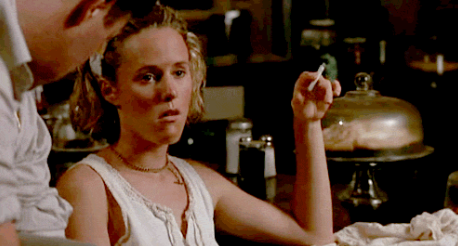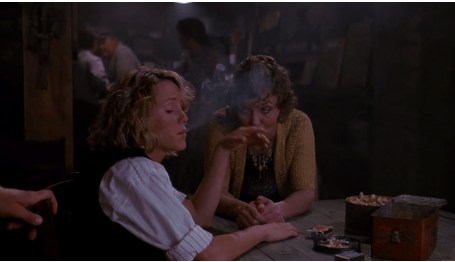
Fried Green Tomatoes is widely celebrated for its rich and compelling main characters, especially the complex dynamics between Idgie Threadgoode and Ruth Jamison. However, what truly elevates the film is the depth and complexity of its supporting characters, whose roles are often understated but essential to the narrative. From the nurturing Ninny Threadgoode to the determined and somewhat tragic Frank Bennett, these characters weave layers of meaning into the storyline and offer invaluable perspectives on the themes of love, friendship, and redemption.
Ninny Threadgoode: The Heart and Soul of the Story
At first glance, Ninny Threadgoode may seem like just an elderly woman telling stories from her past. However, as the story progresses, it becomes evident that Ninny is much more than a mere storyteller. Ninny is the emotional anchor of Fried Green Tomatoes, holding the wisdom of a lifetime and offering the emotional insight necessary for Evelyn Couch’s transformation.
Ninny’s relationship with Evelyn is pivotal. She acts as both a mentor and a catalyst for Evelyn’s journey of self-discovery. Although Ninny is recounting tales of a time gone by, she is also guiding Evelyn toward reclaiming her identity and personal strength. Ninny’s memories offer Evelyn the courage to face her own insecurities and start making changes in her life. In a sense, Ninny embodies the nurturing, unconditional love that can sometimes be absent in other parts of Evelyn’s life. She represents the wisdom gained from surviving hardship, a theme that is mirrored in the lives of the film’s protagonists.
Ninny’s role highlights how the past is not something to be discarded but rather something to learn from. Through her, the film suggests that we are never truly finished with the past; instead, we must allow it to inform our present and future.

Frank Bennett: The Embodiment of Toxic Masculinity
On the opposite side of the spectrum, Frank Bennett, Ruth’s abusive and manipulative husband, represents the darker, more destructive forces in the story. Frank’s character, while not as complex as Ninny or Evelyn, is an essential piece in the narrative’s exploration of abusive relationships and the impact of toxic masculinity.
Frank’s cruelty is a stark contrast to the love and care shown by the women around him. He embodies the oppressive forces that Ruth must overcome in order to reclaim her autonomy. His violent behavior creates a sense of urgency for Ruth to break free from her toxic marriage and find a new sense of self. The transformation that Ruth undergoes is, in many ways, a direct response to Frank’s abuse, making his presence an important catalyst for her journey toward healing.
While Frank is never portrayed as a deeply complex character, his role as the antagonist serves as a necessary foil to the growth and empowerment of the central female characters. His ultimate fate, at the hands of the women he once sought to dominate, is symbolic of the liberation they achieve from the control of oppressive forces.
Sipsey: Strength and Loyalty in the Shadows
Another crucial supporting character is Sipsey, the wise and dignified African-American cook at the Whistle Stop Café. Sipsey may not be as prominently featured as some other characters, but her strength, loyalty, and moral compass make her an integral part of the story.
Sipsey’s role in the narrative is deeply rooted in the themes of family and loyalty. As the cook of the café, she represents the nurturing power of food and serves as a silent but powerful force in the community. She is a stabilizing presence in the midst of chaos and often serves as a guide for the other characters when they are in need of wisdom or clarity. Sipsey’s relationship with the women of Whistle Stop highlights the importance of community and the quiet support that can sometimes be more significant than grand gestures.
Her understated yet profound contributions emphasize the quiet strength found in those who often remain in the background, making her one of the unsung heroes of the film.
Big George: The Gentle Giant
Big George, who works alongside Sipsey at the Whistle Stop Café, is another supporting character whose importance lies in his role as a protector and friend. While Big George’s character is more lighthearted and not given as much screen time, his presence is a reminder of the diverse and multifaceted roles that men can play in a woman’s life.
Big George’s relationship with the women of Whistle Stop is grounded in mutual respect and deep affection. His role in the café provides stability, and he contributes to the overall feeling of safety and belonging that permeates the Whistle Stop community. His quiet strength and loyalty make him an essential part of the group, demonstrating how important it is to have allies, especially for those who are facing immense challenges.
The Café as a Symbol of Support
The Whistle Stop Café itself plays a significant role in the development of the supporting characters, especially in terms of offering emotional support and connection. For each of the characters, whether they are regulars or newcomers, the café provides a sense of community where they can come together to share their experiences, heal from their wounds, and find solace.
Through the café, the film highlights how supportive relationships — even those that seem secondary to the main plot — are often the most important for our well-being. The café isn’t just a setting for the narrative; it is a sanctuary, a place where the complexities of life can be processed and understood. This theme of emotional support is embodied in the characters who, while not always in the spotlight, form the foundation for the more prominent characters’ growth and self-realization.
The Impact of Minor Characters on the Larger Narrative
The minor characters in Fried Green Tomatoes may not receive the same amount of screen time as Idgie or Ruth, but they play indispensable roles in the development of the story’s central themes. They serve as mirrors to the main characters, offering perspectives that help illuminate the struggles of the protagonists. Each supporting character, in their own way, is a thread in the fabric of the Whistle Stop community — a community that nourishes, supports, and empowers its members, even in the face of hardship.
Through their presence, the film reminds us that everyone has a story, and the most profound changes in life often come from the quiet moments shared with those we might overlook.
